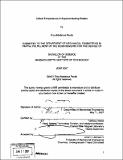| dc.contributor.advisor | Yukikazu Iwasa. | en_US |
| dc.contributor.author | Pavão, Erica Medeiros | en_US |
| dc.contributor.other | Massachusetts Institute of Technology. Dept. of Mechanical Engineering. | en_US |
| dc.date.accessioned | 2008-02-27T22:28:24Z | |
| dc.date.available | 2008-02-27T22:28:24Z | |
| dc.date.copyright | 2007 | en_US |
| dc.date.issued | 2007 | en_US |
| dc.identifier.uri | http://hdl.handle.net/1721.1/40464 | |
| dc.description | Thesis (S.B.)--Massachusetts Institute of Technology, Dept. of Mechanical Engineering, 2007. | en_US |
| dc.description | Includes bibliographical references (p. 30). | en_US |
| dc.description.abstract | Different magnetic strengths in MRIs produce different reactions and provide more insight into what being imaged. Being able to more quickly switch between two or more different magnet strengths would allow scientists in research to be able to gather more useful data. Replacing the persistent-current switch (PCS), which needs to be warmed beyond its critical temperature at times in order to charge or discharge the magnet, with a mechanical switch that can be kept at its superconducting stage may be able to speed up the charging/discharging process. A malleable superconductor would be needed for the current pending design of this switch. A superconducting solder with a critical temperature above 4.2K would be ideal. This experiment uses a bucket Dewar and a cryocooler to attempt to cool the solders to 4.2K and determine at which temperature they become superconducting. The setup, however, was not capable of measuring any of the four tested solders' critical temperature. Reasons for this may include poor thermal contact between the sample and the cryocooler and excessive noise that overpowers small voltages. | en_US |
| dc.description.statementofresponsibility | by Erica Medeiros Pavão. | en_US |
| dc.format.extent | 30 p. | en_US |
| dc.language.iso | eng | en_US |
| dc.publisher | Massachusetts Institute of Technology | en_US |
| dc.rights | M.I.T. theses are protected by copyright. They may be viewed from this source for any purpose, but reproduction or distribution in any format is prohibited without written permission. See provided URL for inquiries about permission. | en_US |
| dc.rights.uri | http://dspace.mit.edu/handle/1721.1/7582 | |
| dc.subject | Mechanical Engineering. | en_US |
| dc.title | Critical temperatures of superconducting solders | en_US |
| dc.type | Thesis | en_US |
| dc.description.degree | S.B. | en_US |
| dc.contributor.department | Massachusetts Institute of Technology. Department of Mechanical Engineering | |
| dc.identifier.oclc | 191734014 | en_US |
